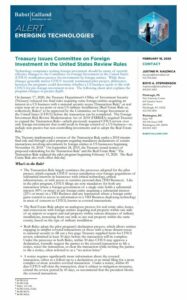“With the pandemic, our clients suddenly cared a lot about whether their contracts included a force majeure provision, what it said, what it meant and how it could be interpreted,” says Attorney Kate Cooper, shareholder at Babst Calland.
Kate Cooper spoke with Smart Business about force majeure provisions and how approaches to them are changing.
Read more.

On March 4th, the Pittsburgh Smart Business Dealmakers Conference will bring together middle-market entrepreneurs, investors and advisers to discuss the new landscape for business and what you can do today to keep your business growing.
Join Chris Farmakis and a group of entrepreneurs and industry-seasoned service providers offer a deep dive into how to make sure you’re checking the right boxes before you go to market—during the deal and post-close.
Following Chris’ session, join Chris, Sara Antol and Kevin Wills in the “Babst Calland Networking Room” to learn more about some of the latest trends in transactions, including use of artificial intelligence tools in due diligence and the increasing use of representations and warranties insurance in mid-market size deals.
As a sponsor of this event, we extend a special invitation for you to attend as our guest. Below is a link you can use to register for a complimentary ticket. Thank you, and we look forward to seeing you there!
Register Today!
 On January 17, 2020, the Treasury Department’s Office of Investment Security (Treasury) released two final rules requiring some foreign entities acquiring an interest in a US business with a national security nexus (Transaction Rule)[1] or real estate near air or sea ports or near US military installations (Real Estate Rule or, collectively, Rules)[2] to be approved by the Committee on Foreign Investment in the United States (CFIUS) before the transaction can be completed. The Foreign Investment Risk Review Modernization Act of 2018 (FIRRMA) required Treasury to expand the Transaction Rule—which previously required CFIUS review over only foreign investments that could result in foreign control of a US business—to include non-passive but non-controlling investments and to adopt the Real Estate Rule.[3]
On January 17, 2020, the Treasury Department’s Office of Investment Security (Treasury) released two final rules requiring some foreign entities acquiring an interest in a US business with a national security nexus (Transaction Rule)[1] or real estate near air or sea ports or near US military installations (Real Estate Rule or, collectively, Rules)[2] to be approved by the Committee on Foreign Investment in the United States (CFIUS) before the transaction can be completed. The Foreign Investment Risk Review Modernization Act of 2018 (FIRRMA) required Treasury to expand the Transaction Rule—which previously required CFIUS review over only foreign investments that could result in foreign control of a US business—to include non-passive but non-controlling investments and to adopt the Real Estate Rule.[3]
The Treasury implemented a version of the Transaction Rule under a 2018 interim final rule and through a pilot program requiring mandatory declarations of certain transactions involving investments by foreign entities in US businesses beginning November 10, 2018.[4] On September 24, 2019, the Treasury issued notices of proposed rulemaking for the Transaction Rule[5] and the Real Estate Rule.[6] The Transaction Rule replaced the pilot program beginning February 13, 2020. The Real Estate Rule also took effect that day.
Read More.

